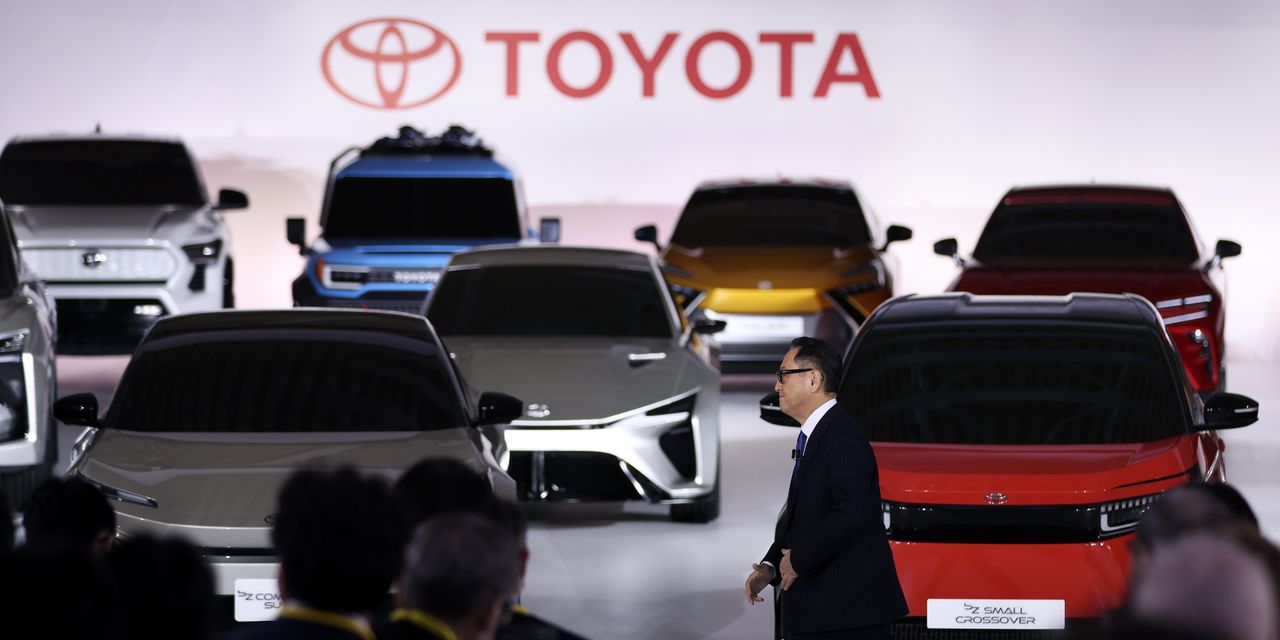
Toyota Motor Corp. TM 2.65% is getting more serious about all-electric vehicles, but not as serious as the likes of Volkswagen or General Motors. Some of its reasons for reticence are better than others.
On Tuesday, the world’s largest car maker by sales made a raft of new commitments to the propulsion technology popularized by Tesla. It is aiming to sell 3.5 million battery electric vehicles (BEVs) by 2030, up from 2 million previously forecast. It expects its luxury brand Lexus to be all-electric in China, North America and Europe by 2030. And a suite of new BEV models will follow Toyota’s flagship bZ4X, which will launch in the U.S. next year.
Still, the company’s messaging remains more nuanced than that of many peers. Its big bet isn’t on BEVs but on diversity. “If we provide the correct solution for the average person, we won’t have the correct solution for everyone,” said President Akio Toyoda at a news conference.
Toyota is still investing heavily in hybrid powertrains, including the technology it pioneered in the 1990s with the Prius. It has earmarked 4 trillion yen, equivalent to about $35 billion, in capital spending for Prius-style hybrids, plug-in hybrid vehicles and fuel-cell EVs by 2030. That is on a par with the 4 trillion yen it will invest in BEVs, including an additional 500 billion yen for batteries announced Tuesday.
Much of Toyota’s reasoning for spreading its bets rings true. As a global company rooted in a culture of cost efficiency through “kaizen,” or continuous improvement, it caters to a wider range of consumer incomes than its peers. It made roughly $33,000 in revenue per vehicle sold in the six months through September, compared with almost $50,000 for GM in the latest quarter. Toyota has less scope than most big auto makers to plan based largely on how the market is evolving in the U.S. and Europe.
BEVs will require widespread charging infrastructure for consumers to adopt them, and to fulfill their green promise they also need electricity grids powered by a growing share of renewables. To be affordable to the average consumer they must get cheaper, potentially through subsidies. These conditions will be met at a variety of different paces, depending on government policy. Mr. Toyoda and his deputies said Toyota was accelerating its BEV investments to reflect fresh commitments to the energy transition made by President Biden in the U.S., among others.
Toyota’s new target of 3.5 million BEVs by 2030 equates to about one-third of current sales. Volkswagen, Toyota’s closest peer, said in July it expected half of its sales to be BEVs by 2030. But even this difference might be mainly a function of geographic mix: VW is big in Europe and China, which are pushing BEV sales harder than the U.S. and Japan—markets where Toyota is big.
Toyota’s insistence on keeping technology options open is harder to understand when it comes to hydrogen. The company has long championed hydrogen fuel-cell EVs, and Mr. Toyoda has recently also started to talk up using the clean-burning fuel in conventional internal combustion engines. While a hydrogen comeback in the passenger car industry can’t be ruled out, BEVs have so much momentum that Toyota seems at high risk of throwing good money after bad.
The Japanese giant is right to plan for a slow transition to BEVs. Preparing for a different technological endgame might be taking the bet on diversity too far.
Heard Stock-Picking Leaderboard
Write to Stephen Wilmot at [email protected]
Copyright ©2021 Dow Jones & Company, Inc. All Rights Reserved. 87990cbe856818d5eddac44c7b1cdeb8
Appeared in the December 15, 2021, print edition as ‘Toyota Keeps Its Options On Electric Vehicles Open—Maybe Too Open.’








